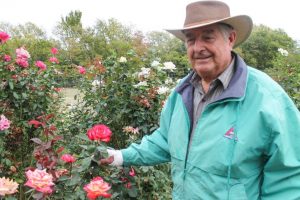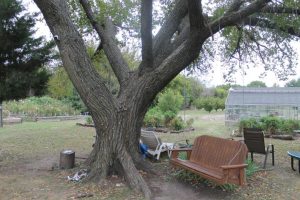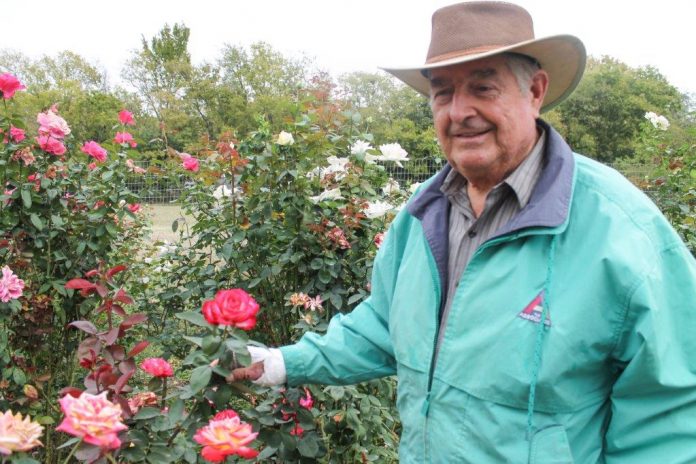
By Dawn Cobb, Contributing Writer
Tucked away in an unexpected area near Denton’s newest business district along University Drive, James “Jim” Herbison quietly hybridizes roses as a hobby.
His after-retirement interests turned into the Gemini Peach & Rose Farm Jim operates with his wife, Janet, who majored in home economics. Together, the duo created a haven for families to pick peaches, walk among hundreds of roses or enjoy a picnic under a 250-year-old Elm tree. A swing rocks invitingly from one of the limbs. A garden grows tomatoes the size of small plates amid bell peppers. Marriages, engagements and photo shoots are a common site at Gemini.
An engineer by trade, Jim started growing roses around the couple’s home and, in 2008, bought the 4-acre lot just off Hinkle Drive north of U.S. 380 at 1301 Haggard Lane.
“I started growing them and they exceeded my backyard,” Jim said. A few roses became 1,000 bushes and, soon, fruit trees – now 140 of them – produced a plethora of plump, juicy peaches.
Most days, you will find Jim, donning his ever-present hat, walking along a trail across the creek that splits his property in half. The winding, canopied trail leads to an outdoor office. A desk and chair sit under the shade of trees not far from a shed and a row of wooden boxes covered with mesh. Inside the boxes are the newest of some 600 grafts to date.

Each graft he creates takes about three to four months to complete. With deft hands and a master gardener’s skill, Jim follows a 12-step process for hybridization, collecting pollen from the “pollen parent” and applying the pollen to the blossom of another rose known as the seed parent. Following fertilizations, seeds form and reach maturity between 90 to 120 days. After chilling, he plants the seeds. They can be slow to sprout, taking from three to 18 months. Jim also follows a process known as cleft grafting.
Jim puts the potted grafts inside wooden boxes, keeping them moist with a mist system his engineering skills designed. Under his watchful eyes, roots grow in three weeks to a month. The repotted plants then allow for additional growth and stabilization before Jim places them in the field.
In short, grafting and hybridizing roses requires patience. However, the results are evident in the bountiful blooms.
The Herbisons have named many of the roses after family members – “Susan Elizabeth” for their daughter along with other names such as “Madison Sophia,” “Madison Marie,” “Jaden Makale” and “Longshot Lena.” However, anyone can have a rose named after someone for about $1,000, which covers the cost of creating the hybrid rose and registering it with the American Rose Society. Visit www.geminipeachandrosefarm.com or call 940-230-5422.
Janet, with clippers in hand, carefully selects rose buds just beginning to blossom. She snips them leaving several rows of leaves, which signals to the bush to regrow. A freshly selected dozen for a visitor costs $10, purposefully cheaper than at most stores. Often, Janet creates bouquets for area churches, long-term care facilities and other organizations free of charge. “It’s just what we do,” Janet said.
“She is proficient in distributing the roses,” Jim added, smiling. The couple often works with area non-profits. Denton Benefit League is one organization that raffled the naming of a rose as a fundraiser.
As Janet busies herself with bouquet creations, Jim eyes the canes growing near his work desk.
Shoots of Fortuniana, a rootstock preferred by southern rosarians, form sizeable whips behind the shed, ready for the next hybridized rose bush. Fortuniana creates a heftier cane for roses grown in the south. Dr. Huey, another rootstock, grows nearby for a different, smaller cane.
As a Master Rosarian with the Dallas Rose Society, Jim is known for his attention to detail when it comes to creating hybrid roses. He has won the Dallas Rose Show five times for the best hybrid tea and the Fort Worth Rose Show four times in the same category.
A walk through the rows and rows of multi-hued roses demonstrates his skill. Behind the shed, another section of roses grows, once including 50 varieties bought by Denton County. From start to finish, the county’s hybridized roses grew for a year and a half.
Denton County crews recently worked with Jim to cut the rose bushes to just over two and a half feet in preparation for transplanting on the four corners around the Courthouse-on-the-Square.
“The roots can’t support the leaves and flowers after the rose bush has been transplanted,” Jim said.
Next spring, however, passersby can expect to see new blossoms along Denton’s downtown Square, thanks to the Herbisons and an after-retirement hobby turned passion.
Dawn Cobb is Director of Community Relations for Denton County.



















